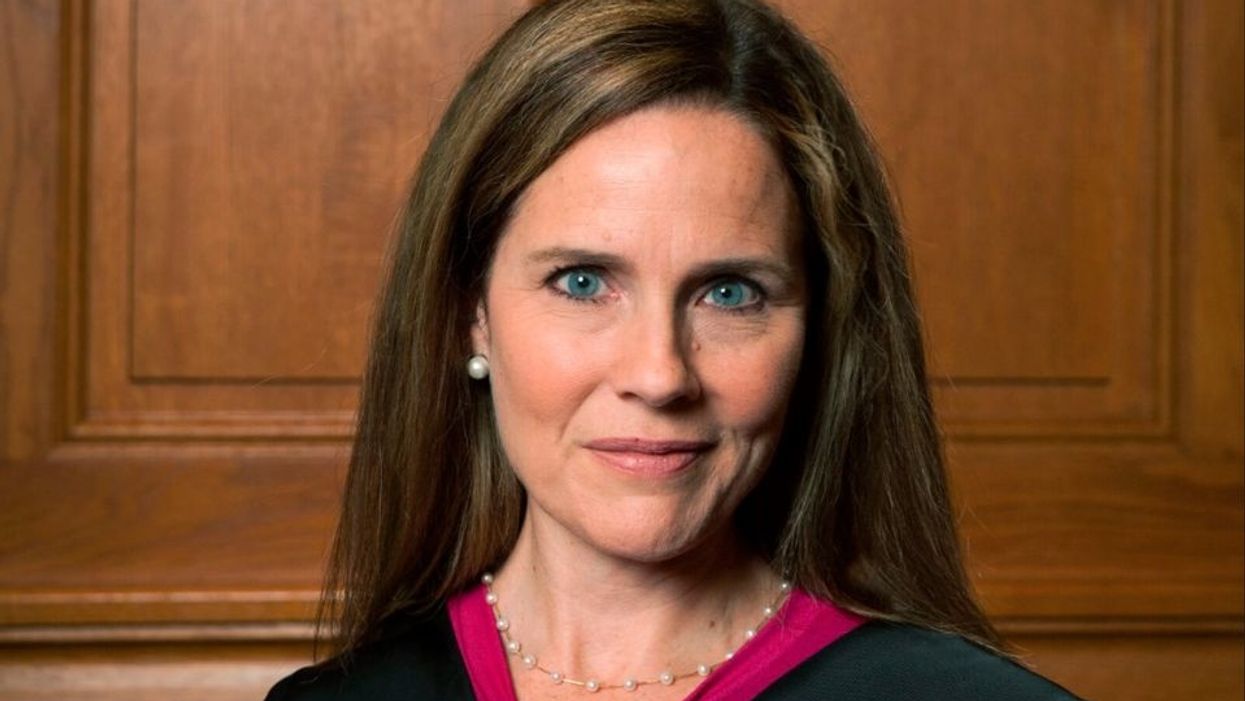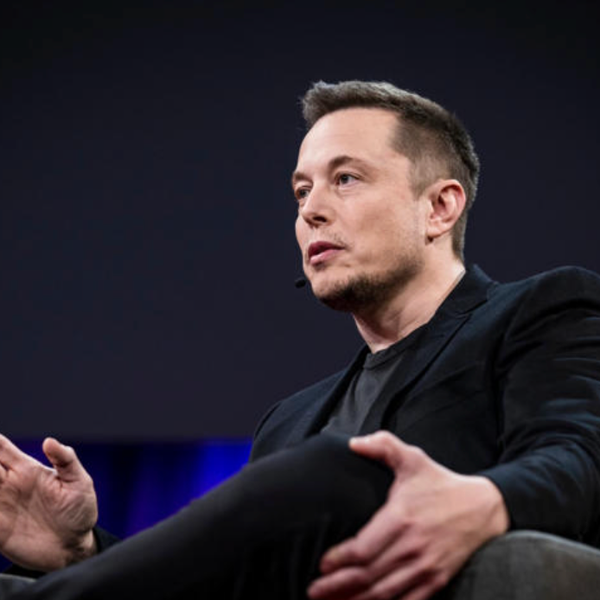Trump Chooses Far-Right Judge Barrett For Ginsburg Seat

Amy Coney Barrett
Donald Trump will select U.S. Appeals Court Judge Amy Coney Barrett as his Supreme Court pick Saturday, multiple news outlets confirmed with White House officials on Friday — and the outlook couldn't be more bleak for reproductive rights, LGBTQ rights, immigration, and the future of health care in the United States.
According to the New York Times, Trump "will try to force Senate confirmation before Election Day."
"The president met with Judge Barrett at the White House this week and came away impressed with a jurist that leading conservatives told him would be a female Antonin Scalia," the Times reported.
Trump has not interviewed any other candidates for the seat, according to people with knowledge of the decision who spoke to the outlet.
The GOP has long had its eye on dismantling Roe v. Wade, the Supreme Court decision that affirmed a woman's right to legal abortion, and Barrett is key to achieving that goal.
In a floor speech in July, Sen. Josh Hawley (R-MO) said he would vote only for a Republican Supreme Court nominee who "explicitly acknowledged" that Roe v. Wade was "wrongly decided" and "understands Roe to be the travesty that it is."
After the death of Justice Ruth Bader Ginsburg, he doubled down on his position on Twitter, calling upon fellow Republican senators to do the same.
Trump has also faced pressure from evangelical groups urging him to confirm Barrett over his likely other pick, Judge Barbara Lagoa.
Tony Perkins, president of the right-wing Family Research Council, said he told the White House that evangelicals wouldn't be pleased with the choice of Lagoa and would only embrace a hardline anti-abortion candidate.
Barrett certainly fits the bill. She has repeatedly and publicly stated her personal conviction that life begins at conception and expressed support for court rulings restricting abortion access. She's also said the GOP should be forceful about appointing judges willing to overturn the landmark decision in Roe.
In a 2013 piece in the Texas Law Review, Barrett listed "superprecedents," cases that she said no court could ever overturn, such as Brown v. Board of Education. Roe was not among them.
Barrett has ruled against abortion rights on at least two occasions since her appointment to the U.S. Court of Appeals for the 7th Circuit — one involving parental consent and one involving fetal disability.
And, given her originalist bent as the heir apparent of the late Justice Antonin Scalia, her singleness of focus on the Constitution's text without regard for context means Roe is in trouble as never before.
The consequences of overturning Roe are far-reaching.
With a majority-conservative Supreme Court, those states that have not yet removed abortion from their criminal code would return to restricted abortion access with no federal guarantee of abortion rights. And it's low-income women and women of color who stand to suffer most from lack of access to reproductive health care.
It's not just reproductive rights that are in jeopardy: Barrett's appointment also threatens LGBTQ rights in an unprecedented way.
A 2017 financial disclosure report shows that Barrett earned $4,200 in 2015 and 2016 from the Alliance Defending Freedom, an anti-LGBTQ organization labeled as a hate group by the Southern Poverty Law Center. The Alliance has supported "recriminalizing homosexuality" and compared the LGBTQ community to pedophiles.
The Human Rights Campaign reports that in a 2016 lecture, Barrett misgendered transgender women as "physiological males who identify as females."
In the same lecture, she said that Title IX protections cannot be extended to transgender individuals and defended the dissenting Supreme Court justices in Obergefell v. Hodges, the landmark decision that made marriage equality the law of the land.
The following year, Barrett refused to rehear a case involving racial discrimination.
With high-profile LGBTQ-rights cases coming up before the Supreme Court, a Barrett confirmation could be disastrous.
This fall, the court will consider Fulton v. City of Philadelphia, deciding whether a religious organization can discriminate against LGBTQ couples when it comes to the placement of foster children.
And a mere week after the election, the Supreme Court will hear oral arguments in a third challenge to Obamacare in California v. Texas. The court's sudden tilt farther to the right — and Barrett's vote — could make all the difference.
The court's decision on whether to strike down the Affordable Care Act will have immeasurable impact on health care in the LGBTQ community, particularly for transgender individuals or those living with HIV.
And Barrett's confirmation puts Obamacare in its entirety and health care for all on the chopping block, too.
She's stated her opposition to the Affordable Care Act, signing a public statement in 2012 calling Obamacare's broad contraception coverage an "assault on religious liberty."
In 2017, she criticized Chief Justice John Roberts for allegedly using creative but unconstitutional loopholes to save the ACA.
During the COVID-19 pandemic, the stakes have never been higher for health care.
Without Obamacare, 23 million Americans could lose their health care coverage, and Americans who have lost employment-based health care due to COVID-19 would find themselves without options. Insurance companies could do away with protections for preexisting conditions, and the Medicaid expansion is at risk.
And the most underserved populations are the most at risk. Barrett has demonstrated she is no friend to immigrants, either.
In June, when a panel of the 7th Circuit blocked the public charge rule from taking effect in Illinois, she said in a dissenting opinion that she would have allowed the rule, the Trump administration's draconian updated regulation denying residency to green card seekers who use government assistance, to go forward.
This is relevant, given that the Trump administration continues to try to gut the Deferred Action for Childhood Arrivals immigration program.
And although the Supreme Court ruled in June that Trump's overturning of DACA was unconstitutional, the administration seems to be ignoring that ruling, and the outcome for young undocumented immigrants brought to the United States as children and protected under the program is tenuous.
The court will soon weigh in on the House of Representatives' attempts to obtain top-secret grand jury materials from the investigation into Russian interference in the 2016 election. And, in the case of a dispute over the presidential election outcome, as happened in 2000, a Supreme Court packed with right-wing extremists would have some hefty decisions on its docket.
One thing is certain: A perfect storm is brewing that threatens established case law and basic human rights, and Barrett's confirmation will only hasten its arrival.
Published with permission of The American Independent Foundation.
- Profiling The Politics Of Trump's Potential Court Nominees - National ... ›
- Danziger Draws - National Memo ›
- Feingold Warns Against Rush To Ram Through Barrett Nomination ›
- Trump Court Nominee Would Jail Doctors Who Provide Reproductive Services To Women - National Memo ›
- Barrett Is Least Popular Supreme Court Nominee Since 1987 - National Memo ›
- At Barrett Hearing, Only Republicans Talk About Religion - National Memo ›
- Watch: Barrett Deflects Questions On Roe, Despite Publicly Urging Its Reversal - National Memo ›
- Barrett Wouldn't Say That Voter Intimidation Is a Federal Crime - National Memo ›
- Barrett Won’t Say Whether Medicare Is Constitutional - National Memo ›
- ‘Far-Right Hack’ Barrett Flaunts Political Allegiance To Trump In Viral Photo Op ›








